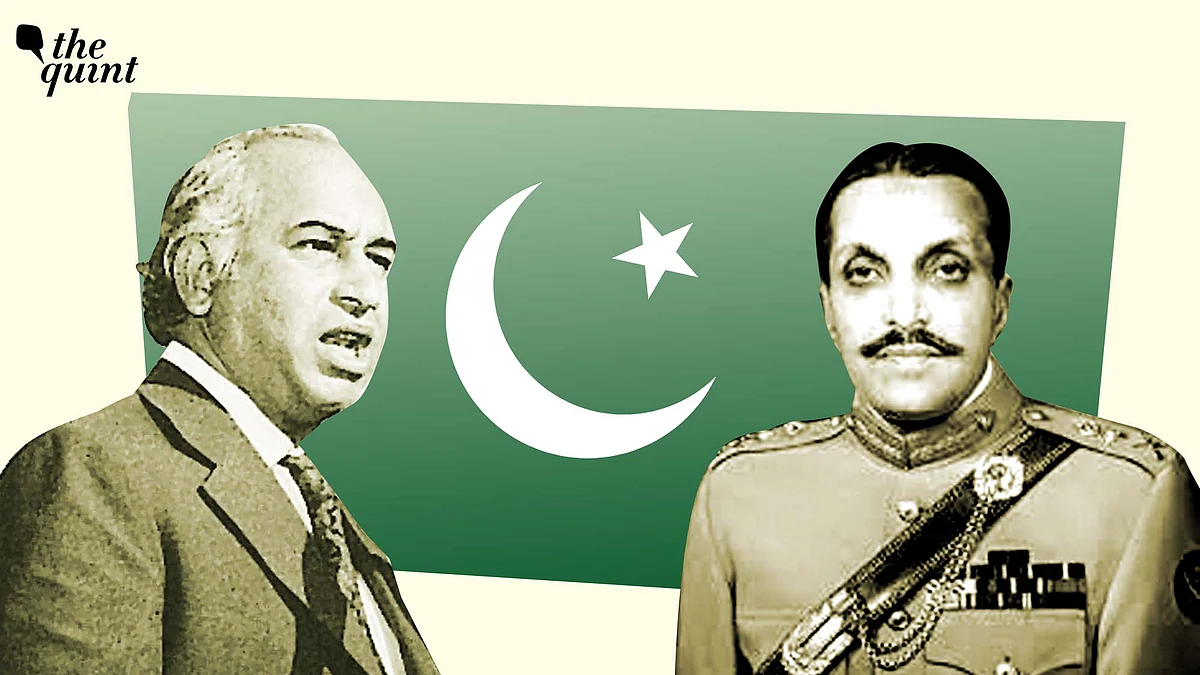
Why the Pakistani Military Can’t Quit the ‘Two-Nation Theory’
All Pakistani leaders have been forced to publicly uphold the foundational 'two-nation theory.'

advertisement
The Pakistani military or ‘establishment’, like Pakistan itself, is deeply divided. On one end are the jolly-ho sort of entitled revellers, who drink whisky to the tune of bagpipes in the Officer’s Mess; on the other, the decidedly more dour and bearded types, whose allegiance is to what they regard as ‘Divine Truth’.
Initially run by British-India cadets trained at Sandhurst (later at Fort Bragg in the US, as imperial power changed hands), the likes of Field Marshal Ayub Khan, Yahya Khan, or even Pervez Musharraf were known to down many ‘chotaas’ (small peg) of distinguished malts in napkinned cut-glasses.
But this two-faced hypocrisy also afflicted Pakistan’s civilian politicians, who were rather colourful in their personal lives and routinely hit the bottle hard, while waxing eloquently on Islamic rituals and insistences. It wasn’t just the Qaid-e-Azam Muhammad Ali Jinnah, who indulged in an occasional tipple, but his successor and the country's first Prime Minister, Liaquat Ali Khan, who once impressed the American Assistant Secretary of State, George McGhee, with his ability to “down many drinks without losing his sobriety."
Playing Politics with Piety
Much later, the charmingly flamboyant Zulfikar Ali Bhutto was to famously insist, “Haan mein sharaab peeta hoon, laikan awam ka khoon nahi peeta” (Yes, I drink but at least I do not drink the blood of the people).
Yet, like the contradictory oscillation from secularity to piety of a Jinnah or Liaquat, the westernised Zulfikar Ali Bhutto also played reckless politics with religion to usher in the most illiberal, unsecular, and majoritarian regulations to perpetuate his rule.
Regardless of their personal indulgences, all Pakistani leaders have been forced to publicly uphold the foundational 'two-nation theory', which was inherently religious, regressive, and predicated on supremacism.
For understandable reasons, Jinnah’s contradictory dalliances and outpourings on secularism had to be buried from the public gaze and obliterated from official records. Duplicity has become a national instinct—normalised as Pakistanis have long run with the hare and hunted with the hounds when it comes to religion.
Zia’s Legacy and the Birth of an Extremist State
The advent of Zia-ul-Haq on the centerstage tilted the balance irrecoverably towards the dodgy alleys of religious extremism, intolerance, and finally, violence. During the Zia era, even the relatively secular institution of the Pakistani Armed Forces soon changed their motto to a more puritanical ‘Iman, Taqwa, Jihad fi Sabullah’ (Faith, Piety, Struggle for Allah), as it was more aligned to the tenets of the ‘land of the pure’ i.e., Pakistan, and its small-spirited ‘two-nation theory’.
All along, the charade of piety was invoked till the time it went out of control and became a beast that turned on its progenitor. From time to time, the Pakistani ‘establishment’ had to take on its terror manifestations like the Taliban and its myriad offshoots, from its nurtured ‘terror nurseries’, as it battles the same right now.
Somehow, a complete breakaway from the crutches of religiosity or its genealogically flawed ‘two-nation theory’ became impossible, as that would be tantamount to delegitimising the national narrative and its foremost institution i.e. the Pakistani ‘establishment’.
It is only the carefully cultivated storyline of an ‘enemy number of one’ across the Line of Control (read India) that rationalises the bloated and over-entitled Pakistani ‘establishment’ that has never won a war (not in 1947-1948, not in1965, not in1971, not in1999, and not even with the installation of Taliban in Afghanistan, as they too have turned on Islamabad).
It is with this backdrop that last week's petty sounding statement of Pakistani Army Chief Asim Munir must be understood.
He was repeating a well-worn line—one that has brought Pakistan little but failure—yet a line that must be repeated if he, and the floundering institution that is the Pakistani military, are to survive.
Already on the backfoot with daily accusations from the popular, though incarcerated, Pakistani leader Imran Khan, the Army Chief has to sound more patriotic and pious than ever. That he is known to be personally pious—having begun his education in a madrassa and memorised the Quran—likely made his statement all the easier.
The General's Religious Calculus
Admission of the abject failure, and terrible price in pandering to religious conservatism, or to the ‘two-nation theory’, is strangely not an option for the General.
On the contrary, he has to downplay the carnage inflicted by extremists from across the Durand Line (Afghanistan-Pakistan border) and instead harp on the age-old India line.
Even though the absurd statement was made on US soil, the Americans are well-versed with the patented double-speak of the Pakistanis. In American calculus, Asim Munir may not be an Ayub, Yahya, or a Pervez, but then perhaps he is also not a Zia-ul-Haq or a Hamid Gul.
Currently, supporting the Pakistani ‘establishment’ to retain stability by allowing them to play to the gallery and cling to the clearly regressive ‘two-nation theory’ may be the best of the worst options available in Pakistan. Despicable and unnecessary as the Army Chief’s words were—particularly coming from a career soldier—they were neither new nor surprising.
(The author is a Former Lt Governor of Andaman & Nicobar Islands and Puducherry. This is an opinion piece, and the views expressed above are the author’s own. The Quint neither endorses nor is responsible for the same.)
- Access to all paywalled content on site
- Ad-free experience across The Quint
- Early previews of our Special Projects
Published: undefined